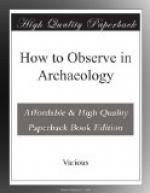Never buy in the dusk or in dark rooms. When buying never have any one at hand who calls attention to things, nor let any attendant interfere. Seem entirely unconcerned.
Get the reputation of never advancing on offers, or bargaining; let taking or leaving things at once be the rule. Time and delays are money to the traveller, and it is worth much to save time in haggling. Your donkey-boy will soon spread your character.
When offering for single things to a peasant, put the money by the side of the antiquity, and say that he must take one or the other: fingering the cash is irresistible, and no time is lost.
If it is likely that the source of an object will not be truly stated, the way is to make the best guess you can, and say it dogmatically: the pleasure of setting you right will often bring out the truth, or if you guessed right it will gain you credit and break down reserve.
As a principle it is well to be looked on as a liberal buyer, so as to encourage the offer of antiquities. A little more thus spent will be a trifling extra on the whole journey, and may largely increase the results in objects and information for future work.
Though prices can only be learned by practice, and they vary in time and place, yet the following scale may be taken as fairly safe.
Bronze figures if good work, inches high squared = shillings: except in bad state, or Osiris, or bad clumsy work, or votive animals.
Papyri or parchment, continuous text, 1 pound a square foot, accounts, half or a third.
Jewellery, between weight in coin and double that, according to work.
Scarabs, common but fair 2s., names 2s.-5s.; up to 5 pounds or 10 pounds if beautiful. Engraved gems, small common Roman, 2s.-4s. in London, more in East; for a fair Greek 1 pound-10 pounds.
Coins often higher in the East than in London. In Greek lands copper coins may be bought by weight, and picked over at leisure, and the worthless coins rejected. For single coins fix a price, say half a franc, and offers of large numbers may come in, from which the best can be chosen and the rest refused.
Glass vases, blown, inches high squared at 4d. or 6d. each. Coloured glass double or triple.
Ushabtis, poor 1s.-4s., fair 5s.-10s., fine blue or engraved 1 pound-10 pounds.
LIST OF THE CHIEF BRITISH INSTITUTIONS AND SOCIETIES CONCERNED WITH THE ARCHAEOLOGY OF THE NEAR AND MIDDLE EAST.
London.
British museum, Bloomsbury, W.C.1.
Director, Sir F. G. Kenyon, K.C.B., P.B.A.
Keeper of Egyptian and Assyrian Antiquities, Sir Ernest
Wallis Budge,
Litt.D.
Keeper of British and Mediaeval Antiquities (including
Prehistoric
Antiquities, Ethnology, and Oriental Antiquities)
Sir Hercules Read,
F.B.A., P.S.A.
Keeper of Greek and Roman Antiquities, A. H. Smith
M.A.
Keeper of Coins, G. F. Hill, F.B.A.
Keeper of MSS., J. P. Gilson, M.A.
Keeper of Oriental MSS. and Printed Books. L.
D. Barnett, Litt.D.




